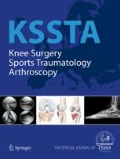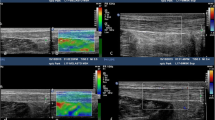Abstract
Tendon-related injuries are a major problem, but the aetiology of tendinopathies is unknown. In tendinopathies as well as during unaccustomed loading, intra-tendinous flow can be detected indicating that extensive loading can provoke intra-tendinous flow. The aim of present study is to evaluate the vascular response as indicated by colour Doppler (CD) activity in both the Achilles and patella tendon after loading during high-level badminton matches. The Achilles tendon was subdivided into a mid-tendon, pre-insertional, and insertional region and the anterior knee tendons into a quadriceps-, patella- and tuberositas region. Intra-tendinous flow was measured using both a semi-quantitative grading system (CD grading) and a quantitative scoring system (CF) on colour Doppler. Intra-tendinous flow in the Achilles and anterior knee tendons was examined in fourteen single players before tournament and after 1st and 2nd match, respectively on both the dominant and non-dominant side. All players had abnormal intra-tendinous flow (Colour Doppler ≥ grade 2) in at least one tendon in at least one scan during the tournament. At baseline, only two of the 14 players had normal flow in all the tendons examined. After 1st match, tendencies to higher intra-tendinous flow were observed in both the dominant patella tendon and non-dominant quadriceps tendon (P-values n.s.). After 2nd match, intra-tendinous flow was significant increased in the dominant patella tendon (P = 0.009). In all other locations, there was a trend towards a stepwise increase in intra-tendinous flow. The preliminary results indicate that high amount of intra-tendinous flow was found in elite badminton players at baseline and was increased after repetitive loading, especially in the patella tendon (dominant leg). The colour Doppler measurement can be used to determine changes in intra-tendinous flow after repetitive loading.


Similar content being viewed by others
References
Alfredson H, Forsgren S, Thorsen K, Lorentzon R (2001) In vivo microdialysis and immunohistochemical analyses of tendon tissue demonstrated high amounts of free glutamate and glutamate NMDAR1 receptors, but no signs of inflammation, in Jumper’s knee. J Orthop Res 195:881–886
Alfredson H, Ohberg L, Forsgren S (2003) Is vasculo-neural ingrowth the cause of pain in chronic Achilles tendinosis? An investigation using ultrasonography and colour Doppler, immunohistochemistry, and diagnostic injections. Knee Surg Sports Traumatol Arthrosc 115:334–338
Aström M, Gentz CF, Nilsson P, Rausing A, Sjöberg S, Westlin N (1996) Imaging in chronic achilles tendinopathy: a comparison of ultrasonography, magnetic resonance imaging and surgical findings in 27 histologically verified cases. Skeletal Radiol 257:615–620
Boesen MI, Boesen M, Langberg H et al (2010) Musculoskeletal colour/power Doppler in sports medicine: image parameters, artefacts, image interpretation and therapy. Clin Exp Rheumatol 28:103–113
Boesen MI, Boesen A, Koenig MJ, Bliddal H, Torp-Pedersen S (2006) Ultrasonographic investigation of the Achilles tendon in elite badminton players using color Doppler. Am J Sports Med 3412:2013–2021
Boesen MI, Koenig MJ, Torp-Pedersen S, Bliddal H, Langberg H (2006) Tendinopathy and Doppler activity: the vascular response of the Achilles tendon to exercise. Scand J Med Sci Sports 166:463–469
Chard MD, Lachmann SM (1987) Racquet sports–patterns of injury presenting to a sports injury clinic. Br J Sports Med 214:150–153
Clain MR, Baxter DE (1992) Achilles tendinitis. Foot Ankle 138:482–487
Cook JL, Kiss ZS, Ptasznik R, Malliaras P (2005) Is vascularity more evident after exercise? Implications for tendon imaging. AJR Am J Roentgenol 1855:1138–1140
Cook JL, Malliaras P, De LJ, Ptasznik R, Morris M (2005) Vascularity and pain in the patellar tendon of adult jumping athletes: a 5 month longitudinal study. Br J Sports Med 39(7):458–461
Couppe C, Kongsgaard M, Aagaard P et al (2008) Habitual loading results in tendon hypertrophy and increased stiffness of the human patellar tendon. J Appl Physiol 1053:805–810
Ellegaard K, Torp-Pedersen S, Henriksen M, Lund H, Danneskiold-Samsoe B, Bliddal H (2009) Influence of recent exercise and skin temperature on ultrasound Doppler measurements in patients with rheumatoid arthritis–an intervention study. Rheumatology (Oxford) 4812:1520–1523
Fahlström M, Björnstig U, Lorentzon R (1998) Acute Achilles tendon rupture in badminton players. Am J Sports Med 263:467–470
Fahlström M, Björnstig U, Lorentzon R (1998) Acute badminton injuries. Scand J Med Sci Sports 83:145–148
Fahlström M, Lorentzon R, Alfredson H (2002) Painful conditions in the Achilles tendon region in elite badminton players. Am J Sports Med 301:51–54
Fredberg U, Bolvig L, Andersen NT (2008) Prophylactic training in asymptomatic soccer players with ultrasonographic abnormalities in Achilles and patellar tendons: the Danish Super League Study. Am J Sports Med 363:451–460
Fredberg U, Stengaard-Pedersen K (2008) Chronic tendinopathy tissue pathology, pain mechanisms, and etiology with a special focus on inflammation. Scand J Med Sci Sports 181:3–15
Hensley LD, Paup DC (1979) A survey of badminton injuries. Br J Sports Med 134:156–160
Hess GW (2010) Achilles tendon rupture: a review of etiology, population, anatomy, risk factors, and injury prevention. Foot Ankle Spec 31:29–32
Hoksrud A, Ohberg L, Alfredson H, Bahr R (2008) Color Doppler ultrasound findings in patellar tendinopathy (jumper’s knee). Am J Sports Med 369:1813–1820
Höy K, Lindblad BE, Terkelsen CJ, Helleland HE, Terkelsen CJ (1994) Badminton injuries–a prospective epidemiological and socioeconomic study. Br J Sports Med 284:276–279
Järvinen TA, Kannus P, Paavola M, Järvinen TL, Jozsa L, Järvinen M (2001) Achilles tendon injuries. Curr Opin Rheumatol 132:150–155
Jörgensen U, Winge S (1987) Epidemiology of badminton injuries. Int J Sports Med 86:379–382
Jörgensen U, Winge S (1990) Injuries in badminton. Sports Med 101:59–64
Kannus P, Paavola M, Paakkala T, Parkkari J, Järvinen T, Järvinen M (2002) Pathophysiology of overuse tendon injury. Radiologe 4210:766–770
Khan KM, Forster BB, Robinson J et al (2003) Are ultrasound and magnetic resonance imaging of value in assessment of Achilles tendon disorders? A two year prospective study. Br J Sports Med 372:149–153
Koenig MJ, Torp-Pedersen S, Boesen MI, Holm CC, Bliddal H (2010) Doppler ultrasonography of the anterior knee tendons in elite badminton players: colour fraction before and after match. Br J Sports Med 442:134–139
Koenig MJ, Torp-Pedersen S, Qvistgaard E, Terslev L, Bliddal H (2004) Preliminary results of colour Doppler-guided intratendinous glucocorticoid injection for Achilles tendonitis in five patients. Scand J Med Sci Sports 142:100–106
Koenig MJ, Torp-Pedersen ST, Christensen R et al (2007) Effect of knee position on ultrasound Doppler findings in patients with patellar tendon hyperaemia (jumper’s knee). Ultraschall Med 285:479–483
Kroner K, Schmidt SA, Nielsen AB et al (1990) Badminton injuries. Br J Sports Med 243:169–172
Kujala UM, Sarna S, Kaprio J (2005) Cumulative incidence of achilles tendon rupture and tendinopathy in male former elite athletes. Clin J Sport Med 153:133–135
Levi N (1997) The incidence of Achilles tendon rupture in Copenhagen. Injury 284:311–313
Martinoli C, Derchi LE, Rizzatto G, Solbiati L (1998) Power Doppler sonography: general principles, clinical applications, and future prospects. Eur Radiol 87:1224–1235
Mills R (1977) Injuries in badminton. Br J Sports Med 111:51–53
Ohberg L, Lorentzon R, Alfredson H (2001) Neovascularisation in Achilles tendons with painful tendinosis but not in normal tendons: an ultrasonographic investigation. Knee Surg Sports Traumatol Arthrosc 94:233–238
Rasmussen OS (2000) Sonography of tendons. Scand J Med Sci Sports 106:360–364
Reiter M, Ulreich N, Dirisamer A, Tscholakoff D, Bucek RA (2004) Colour and power Doppler sonography in symptomatic Achilles tendon disease. Int J Sports Med 254:301–305
Richards PJ, Dheer AK, McCall IM (2001) Achilles tendon (TA) size and power Doppler ultrasound (PD) changes compared to MRI: a preliminary observational study. Clin Radiol 5610:843–850
Richards PJ, Win T, Jones PW (2005) The distribution of microvascular response in Achilles tendonopathy assessed by colour and power Doppler. Skeletal Radiol 346:336–342
Ristolainen L, Heinonen A, Turunen H et al (2009) Type of sport is related to injury profile: a study on cross country skiers, swimmers, long-distance runners and soccer players. A retrospective 12-month study. Scand J Med Sci Sports 203:384–393
Seynnes OR, Erskine RM, Maganaris CN et al (2009) Training-induced changes in structural and mechanical properties of the patellar tendon are related to muscle hypertrophy but not to strength gains. J Appl Physiol 1072:523–530
Terslev L, Qvistgaard E, Torp-Pedersen S, Laetgaard J, Danneskiold-Samsoe B, Bliddal H (2001) Ultrasound and Power Doppler findings in jumper’s knee—preliminary observations. Eur J Ultrasound 133:183–189
Weinberg EP, Adams MJ, Hollenberg GM (1998) Color Doppler sonography of patellar tendinosis. AJR Am J Roentgenol 1713:743–744
Weir MA, Watson AW (1996) A twelve month study of sports injuries in one Irish school. Ir J Med Sci 1653:165–169
Winge S, Jörgensen U, Lassen NA (1989) Epidemiology of injuries in Danish championship tennis. Int J Sports Med 105:368–371
Acknowledgment
The study was supported by the OAK foundation.
Author information
Authors and Affiliations
Corresponding author
Rights and permissions
About this article
Cite this article
Boesen, A.P., Boesen, M.I., Koenig, M.J. et al. Evidence of accumulated stress in Achilles and anterior knee tendons in elite badminton players. Knee Surg Sports Traumatol Arthrosc 19, 30–37 (2011). https://doi.org/10.1007/s00167-010-1208-z
Received:
Accepted:
Published:
Issue Date:
DOI: https://doi.org/10.1007/s00167-010-1208-z




